When Primark opened its biggest ever store in Birmingham two years ago, more than 300 people queued to check out the Disney-themed cafe, beauty salons and fashion bargains. The launch seemed to mark a resurgence of the city centre: here was a new kind of department store, to sit alongside the established Debenhams and a swanky architect-designed John Lewis, which had opened less than four years earlier.
When Birmingham city centre stores reopen on Monday, there will be a very different atmosphere. John Lewis is empty, one of 16 shops the chain has closed in the past year; Debenhams will reopen only to clear stock, as its remaining 124 outlets permanently disappear from high streets and shopping centres. Some of Debenhams’ biggest neighbours in the Bullring shopping centre, including Topshop and Gap, will not reopen. Meanwhile, the Primark chain lost £1.5bn of sales in 2020 after months of enforced closure.
Birmingham provides just a snapshot of what is happening in British towns and cities. The rapid expansion of shopping centres and retail space over the last 20 years, many built on the outskirts, has cranked into reverse. Town centres were already suffering from that over-exuberant growth, as people switched from spending money on stuff to experiences and technology: holidays, nights out or nights in with Netflix. Shopping was already less of a fun day out and more of a chore, one that could be done more efficiently online. The pandemic has supercharged these trends.
Alongside Debenhams and Topshop (and its sister chains, Dorothy Perkins and Miss Selfridge), the likes of Oasis and Warehouse have disappeared permanently. There will be at least 11,000 fewer retail outlets in operation than a year ago, according to the latest report from analysts at the Local Data Company (LDC). More closures are on the way.
Most analysts believe these changes are permanent: more than a third of total retail sales were online in January, 36%, according to the Office for National Statistics, up from 20% a year before and 14% five years ago. Town centres are being reinvented to include alternatives to shops – from entertainment and leisure, to community services such as healthcare and education spaces, as well as more homes and offices. Some towns and cities, including Nottingham, Stockton-on-Tees and Stretford in Greater Manchester, are planning to raze moribund shopping centres in order to replace them with parks, wildlife spaces and public squares. Both John Lewis and Marks & Spencer have applied for planning permission to switch large parts of their flagship London stores on Oxford Street to office space. Coventry’s plans for redevelopment of its Upper Precinct shopping mall include a medical centre, cinema and hotel. Around the country, department stores are being transformed into housing and hotels, indoor markets, bowling alleys or crazy golf – even university lecture halls.
“The high street that existed in most people’s eyes is dead, dead, dead,” says Bill Grimsey, a former executive at Iceland, Wickes and Tesco, who has backed three reports into the future of the high street. “It started when retailers like me moved out of town in the 1980s. We cannot rely on shops any more – we need to change and be a community hub.”
All of this is not necessarily bad news for neighbourhoods that have longed for high streets with character. After the scorched-earth closures of recent years, Grimsey says local communities are coming together to decide how their town centres should be revived. Millions of pounds of government funding, via the High Streets Task Force, is supporting ideas for local needs, rather than projects developers are prepared to pay for.
Independent businesses will be an important part of that change.
While most of the big chains have suffered, with 4.5% of their outlets disappearing, independent shops, restaurants and bars have fared much better, with the number of stores down just 0.4% year on year, according to LDC. Government support measures, including business rates relief, furlough pay and a moratorium on evictions for those who are struggling to pay rent, have all helped to keep small businesses afloat. Villages and commuter towns, many of which are filled with independents, have out-performed city centres, reviving hopes for a reversal of years of decline.
Within cities, meanwhile, the pandemic has seen a surge in the development of infrastructure to enable walking and cycling, laying the groundwork for more people-centred, less polluted environments. Anne Hidalgo, the mayor of Paris, has popularised the idea of creating “15-minute cities”, where all the facilities we need are close at hand – so there is less need to use a car. Different interpretations of the concept are being tried in Barcelona, Milan and Melbourne, while the London mayor, Sadiq Khan, has introduced the Streetspace programme to encourage cycling and walking.
After months stuck at home, with few holidays or nights out, the Bank of England is predicting that Britons will go on a spending spree once restrictions are lifted. The chances are that more independent local shops will ring up a good proportion of those sales. The clone high street is dead: long live the neighbourhood.
Sarah Butler is the Guardian’s retail correspondent
‘People complain about City bonuses, but that money feeds businesses like mine’: J Rogers & Sons shoe repairs, London
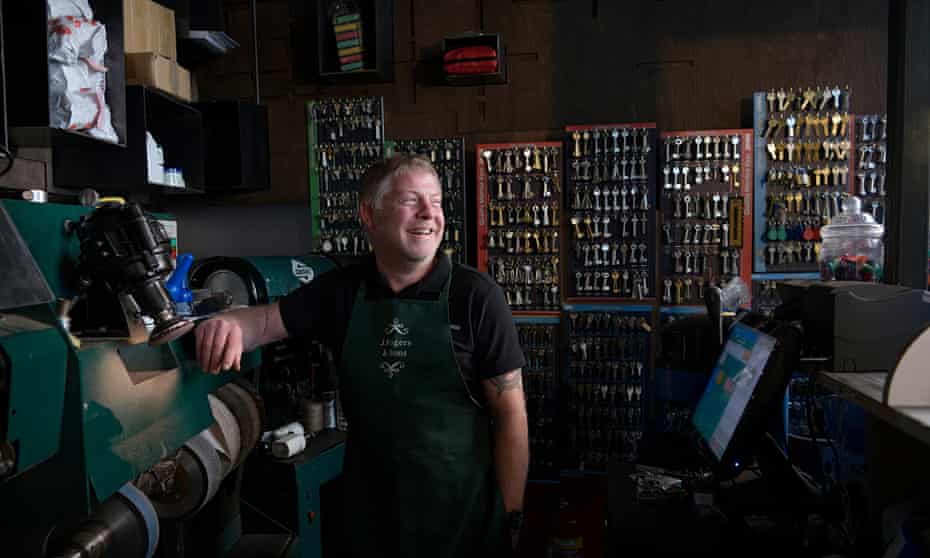
On the first day of the first lockdown last March, rents were due on Danny Rogers’ City of London cobblers – a family business, established by his father, John, 35 years ago.
“When the money came out of my bank account that day, I wondered where the next lot would come from,” says the 49-year-old, who employs nine staff across several London branches. Their original London Bridge shop closed its doors for good last February, before the chain’s weekly takings dropped from £22,000 to less than £3,000. Their largest shop, at Liverpool Street, sits among the coffee and sandwich shops that serve the Square Mile. It all fell silent. “People complain about City bonuses,” says Rogers, “but that money feeds businesses like mine. It disappeared overnight.” For now, his shoe repair and key-cutting machines are in storage.
Rogers has worked for the business since he was 18. Last year he attempted, briefly, to reopen the neighbourhood branches between lockdowns, but slow trade and the dip in commuters made it unsustainable; they closed again after a month. “We weren’t in touch with many of our customers, although one did complain that his shoes were locked in the store.”
Rent negotiations with more accommodating landlords have allowed them to keep bills down. “They’ve been the difference between surviving or not,” Rogers says. He has bounce-back loans and an overdraft to pay back, but his biggest concern was staff; he had to make someone redundant for the first time.
“We’ve stayed in touch over WhatsApp. Some live alone, so I’ve called to check in. Before Covid, our morning rush started at 8am, then we’d be nonstop. It’s hard when that’s taken away from you. I’ve had sleepless nights. Bigger businesses have folded, but this is my money, my family’s house on the line,” says the father of two.
While he remains optimistic about the future (“Some businesses benefit from a downturn: if people don’t have money to buy new stuff, they get old things repaired”), the past year is not one he hopes to revisit. “The City is a resilient place, but it will be among the last to return.” Rogers says that over the decades his customers “have gone from stilettoed ladies in typing pools and Scotland Yard, to solicitors and bankers. We’ve survived recessions and an IRA bomb blast. But this has been the hardest time in working memory.”
‘The last luxury women want to give up is their hair – it’s part of feeling good’: Mayrees hair salon, Aberdeen
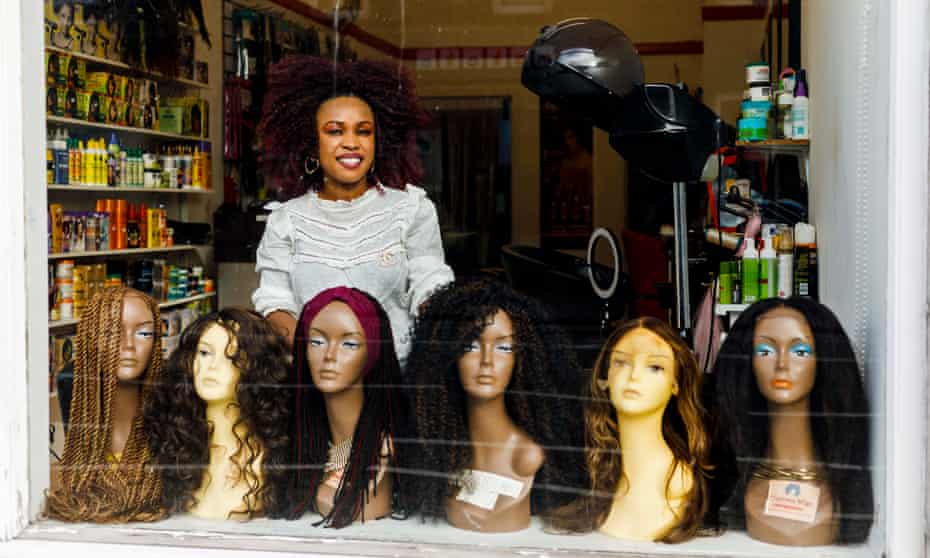
“As the weeks went by, the phone started pinging,” says Mariam Campbell, of the hundreds of women who usually keep her appointment-only salon busy. As an afro hair stylist, Campbell’s clients usually book in every four to eight weeks; when lockdown hit they needed her help. “I had constant messages from customers wanting advice on how to treat their hair or take braids out. When I first closed the doors, there were definitely a few hoping I’d let them in through the back, or go to their homes.” But she didn’t.
Sitting in her empty salon, nestled among a dozen shops on King Street, the 38-year-old remembers the panic that set in last March. “I had a waiting list of people trying to fit in appointments. The last luxury women want to give up is their hair – it’s part of feeling good about yourself .” At home, Campbell was looking after her children, aged four and nearly two, alone for weeks at a time while her husband worked on an offshore oil rig. “Clients reached out to see how I was coping. People have been kind, offering help or support. But everyone was struggling. When I reopened in August, the biggest change was the toll it had taken on my customers’ mental health – even my most cheerful lady.”
Campbell moved to the UK from Ghana when she was 18, to study biomedicine and join her mother, a midwife, in London. Her mother asked her to learn basic hairdressing skills, because she couldn’t find a good black hairdresser, so she got a job as a stylist on Tottenham High Road. She opened her Aberdeen salon (where she is the sole stylist) in 2012, and works long hours. So while extra time with her children has been a silver lining, the worry over her business has been horrendous, she says. While Aberdeen’s death rate was slightly below the Scottish average in the first wave, she grieved the loss of a favourite 70-year-old customer. “She was like a mum to me.”
When Campbell reopened last summer, there were not enough months to catch up on lost trade. “Every client had to be seen. By Christmas, I had waiting lists. People were getting frustrated.” Her takings were down 80% over the year, and yet she is accepting. “No grants will make up for what businesses have lost. But it has also been a reminder of how much our customers value us.”
‘Our high street has a nostalgic feel. You can’t replicate that online’: St Ives Bookseller, Cornwall
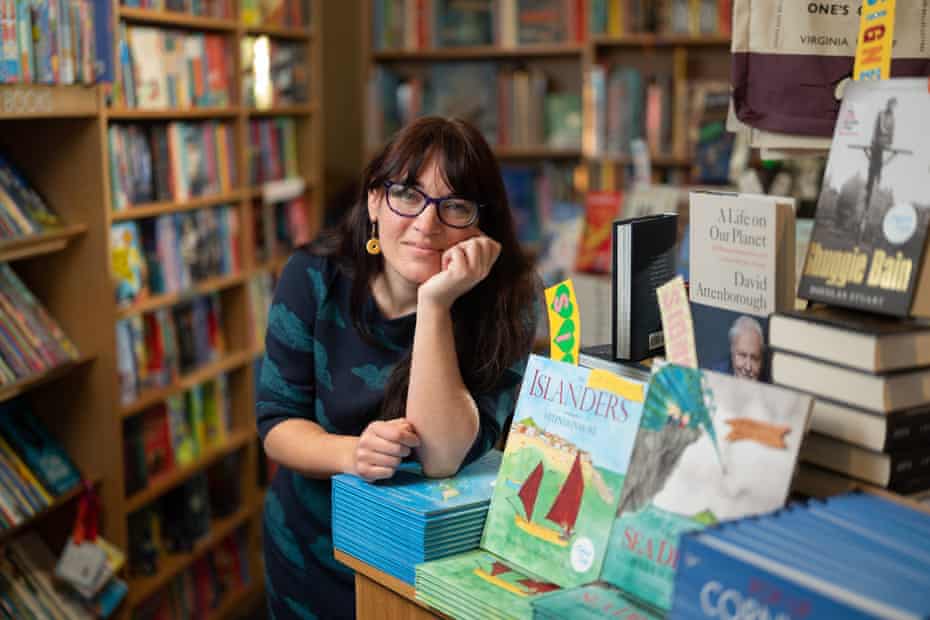
The pretty little shops packed into the higgledy-piggledy buildings of Fore Street usually throng with tourists, second homeowners and locals. But the onslaught of British holidaymakers when travel restrictions eased last July (but social distancing did not) was a challenge for dozens of shop owners on the narrow stretch.
“High summer is always our busiest time,” says Alice Harandon, 34, manager of St Ives Bookseller. “After three months with our doors closed, it was wonderful to feel that buzz again, but it was scary. It felt like the whole of the UK was in our town. I was squeezing past customers to replenish books, stock was toppling over. There was no browsing and people were queueing outside. We’d largely kept the virus out of St Ives, so thousands of people during a pandemic was a worry. I was happy to be open, but it was a lot of responsibility.”
Harandon has managed the store (one of three in a family-owned group across Cornwall) for 11 years. She says the whole year was about “finding a route back” to normal trade. “Before the first lockdown, some shopkeepers started to close. There was no social distancing and having to decide for ourselves what was safe wasn’t working.” It was painful, but there was some relief at closing and taking a break from that juggle.
The shop furloughed four staff, built a website and joined bookshop.org, an Amazon alternative that sells only from independent stores. Harandon took part in local online events, and joined a Facebook group established by a neighbouring shop owner. “That’s been great for a friendly hand-hold,” she says, but adds: “Our high street has a nostalgic feel. People spend a day wandering. You can’t replicate that online.”
Across the UK, book sales defied the pandemic to hit an eight-year high, as people made time for reading. But while click and collect allowed Harandon to make up for some of the sales lost to November’s lockdown, the year’s takings dropped by a third. “We won’t make that money back, but we’re excited to open again. Last time, we didn’t know if people would come back, but they did. And they will again.”
‘It was no longer just about selling groceries. We served a purpose’: Fresh Save Fruit & Veg, Manchester
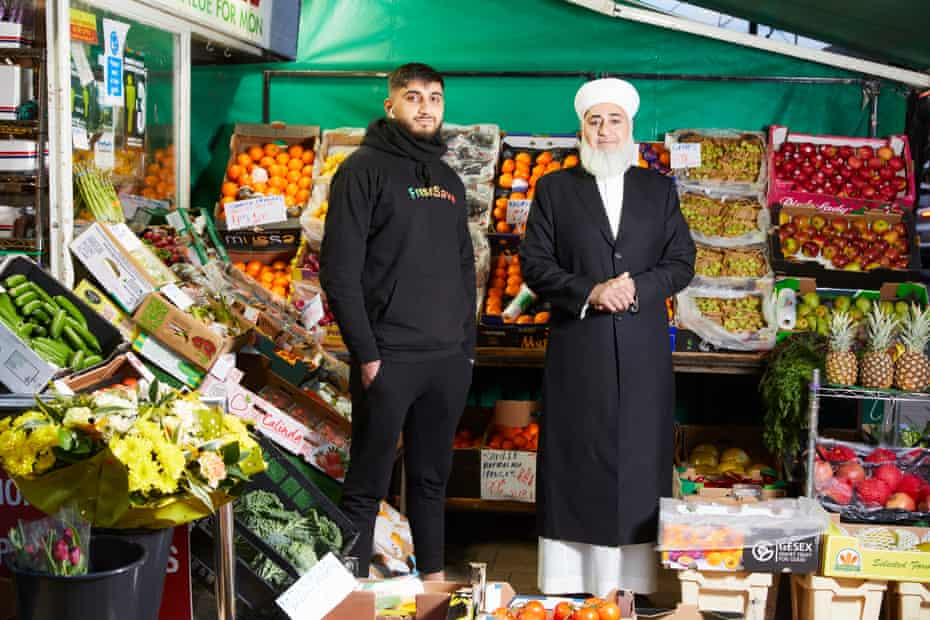
“Before the pandemic, our biggest problem was the weather,” says greengrocer Mohammed Shafiq, 59, his store stacked floor to ceiling with produce. “If it was chucking it down, people drove to the supermarket instead.” But for a period the supermarkets couldn’t cope. “Their shelves were empty. There was panic. A local shop offered security and availability – I even started stocking toilet paper for the first time. The Saturday before lockdown, you couldn’t move in the shop.”
Shafiq, who has run the business on the 500m shopping stretch in Didsbury for 16 years, has pulmonary fibrosis. “Covid was around, but restrictions weren’t. It was frightening,” he says. In the early weeks, he limited the time he spent in the store. His son, Hammaad, 22, helped run the store alongside his pharmaceutical studies. While the high street felt “eerie”, demand shot up. “People would be outside at 7.30am, waiting for us to open. It was no longer just about selling fruit and veg. We served a purpose. Our customers are our friends; I know their families, what job they do.”
Not all their neighbours did so well. “It was humbling to stay open while shopkeepers, like one of the nearby cafes that did better than us before, closed their doors. There was a sense of mutual respect, that we’d each played our part, when everyone returned.”
Across the year, their takings have more than doubled. “People were at home, cooking three meals a day. They weren’t buying lunch in the city centre, or dinner on their way home. Financially, it was the best year I’ve had.” Only Christmas was quieter than usual, with people cooking for smaller numbers.
It was the first year he hadn’t had to ask for a rent deferral, paying every month on time, and he was able to invest in the business. “Ever since I’ve been here, I’ve struggled to pay bills. Tens of thousands in rent is a lot to claw back from carrots. I bought a storage fridge and a new van. It’s been a strange but welcome boost.”
‘People sent gifts in a different way this year: in place of a hug’: Wonder Stuff gift shop, Treorchy, Rhondda Valley
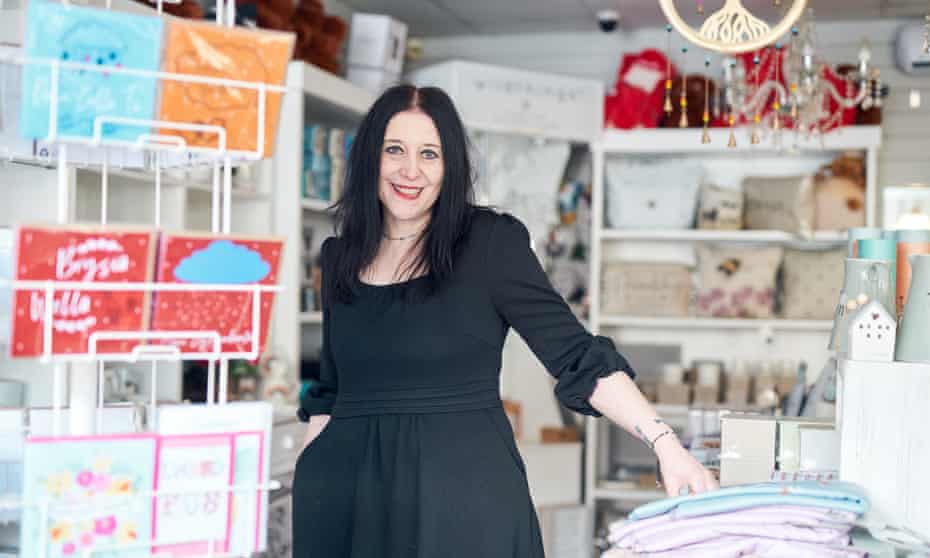
At the start of 2020, this stretch in the former mining town of Treorchy, south Wales, was named Britain’s best high street. By the end of the same year, the surrounding area of Rhondda Cynon Taf had more Covid deaths per capita than anywhere else in the UK.
“Most people I spoke to had either had the virus or knew someone who had it or died,” says Alison Chapman, 52, who has run her Bute Street gift shop for 20 years. “They’ve been looking for the light at the end of the tunnel – the moment they get back out and shop, work and socialise like they used to.”
Wonder Stuff (named after Chapman’s favourite alt-rock band) is staffed by her, her twin children and her mother, all furloughed in lockdown. “I had a tea room at the back, serving my mother’s cakes. People have always gathered here, and business was pretty good.”
The town fell quiet before lockdown even arrived. “By early March, there was a difference in the air. Customers began saying, ‘I don’t know when I’ll next see you.’ The week before lockdown, there was no one around. I shut early for the first time in 20 years.”
She built an online shop and introduced delivery, then click and collect. “The only reason the past year has been manageable, financially, is because I have loyal customers, and I own the building we are in.” Chapman went to her store every day, to occupy herself with small tasks. “I wanted to keep going. I’ve missed the busyness, the routine. The dark nights and uncertainty about when it would end made the winter particularly hard.”
But a busy summer, early Christmas shopping and a demand for sentimental gifts have helped her retain 80% of her trade. “People sent gifts in a different way this year: in place of a hug.”
‘I’m normally in the shop seven days a week. It was nice to have time off, a chance to reflect’: Silly Billy’s toyshop, Hebden Bridge
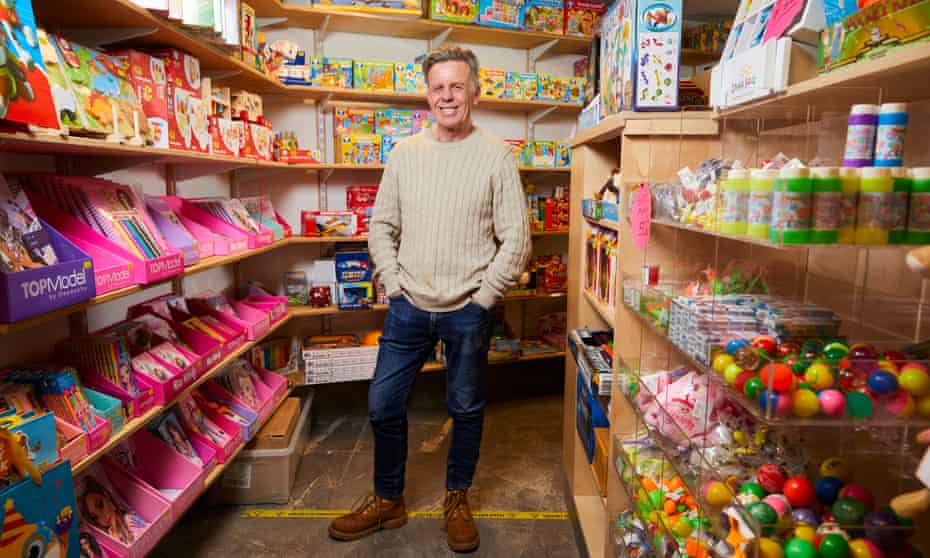
“We’re the kind of community where everyone knows one another by name,” says Bill Deakin, whose traditional toyshop has felt the warmth of a tight-knit market town over the past year. “Shopkeepers have checked on each other in the street, or called in when they reopened last June. Like the town itself, there’s been a lot of camaraderie. People look after each other here, like the community effort in the cleanup after the floods.” Deakin’s original premises were wiped out by the 2015 floods that devastated the area; there was further flooding last summer.
Hebden Bridge’s Old Gate is made up almost entirely of independents. “Customers were sad to see us close. There were lots of good wishes,” says the 62-year-old, who opened the town’s only toy store in 1997. Its shelves are packed with Lego, Playmobil and the pocket-money toys popular with the town’s families and visitors. “When we reopened in the summer, locals happily turned out to support us, despite their own fears about the virus – although we suffered from people being less able to travel across county borders.”
When the pandemic hit, Deakin’s priority was staying solvent; trade halved over the year. “I squared away my finances, paid off creditors, then sat in the sun for three months and read the papers. I’m normally in the shop seven days a week. It’s been tough for many, but it was nice to have time off, a chance to reflect.”
He put his one employee on furlough and started selling online. It helped, but was no substitute for having the doors open. “In business, you’re always short- and long-term planning. Not knowing how long closures would last has been the hardest part. The government support has been a token gesture.” The decision to shut shops the week before Christmas, following a November lockdown, was a huge blow: “We usually do two-thirds of our annual takings during those months.”
But the town has recovered from testing times before. “Like everything else Hebden Bridge has been through, this is not insurmountable. I’m an eternal optimist. Running a business isn’t about luck. It’s about being able to change. Shit happens. The sun always comes out.”
‘I’m already getting orders. There are going to be a lot of weddings in a short time’: Stephanie Moran Couture bridal shop, Tadcaster
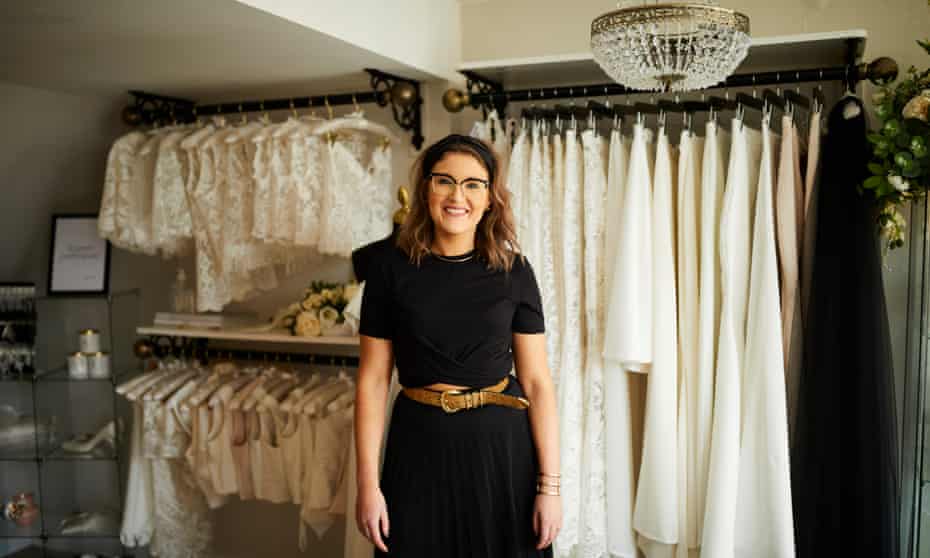
“My business has not taken a penny for over a year,” says bridal designer Moran, who has had seven custom-made white and ivory dresses hanging in her North Yorkshire shop since she closed last March. “I cried the whole way home that day.”
While other businesses found ways to adapt, the wedding industry was left with no options. “I have a WhatsApp group with the ladies who own the florist and dress agency on either side of me, and talk immediately turned to how we would manage financially. I had 12 orders for 2020, each costing upwards of £3,000. All those weddings were cancelled.
“The first thing I did was ring all my brides. It wasn’t about keeping their business. I put myself in their shoes, and they were equally concerned about me. Those conversations continued, over phone and email, all year.” All of them decided to postpone.
Moran suffers from Crohn’s disease and shielded through the first wave. As a relatively new business, her access to government support was limited. “The money I got was purely to keep the shop. I couldn’t pay myself.” She earned a small income writing for a wedding blog, did clothes alterations, and helped out in friends’ shops that reopened while hers stayed closed. “I relied on any penny I could bring in.”
None of her brides opted for smaller weddings, as government rules on guest numbers fluctuated through the year. “I would book brides back in [for fittings] and then have to cancel them again. It was stressful and upsetting for us all. At Christmas, I made the decision not to rebook appointments until there was a clearer way out.”
It wasn’t only the income she missed. “I work with brides for more than 18 months. I get to know them and their families. Some become friends and I go to their weddings. That meaningful contact time was a big loss, emotionally.”
Big weddings with big dresses will not return before 21 June. When Moran reopens, she will be in demand. “I’m already getting new orders, as people begin to book in wedding dates for later this year. There are going to be a lot in a short space of time.
“For some wedding businesses there has been a grieving stage. Many are small like mine, and suppliers I work with have closed. My brides were so supportive. No one asked for any payments back – they even offered to continue paying instalments, although I didn’t take them up on it. Not everyone had that. I feel proud that we made it through.”
This content first appear on the guardian
